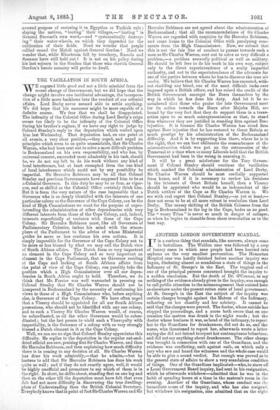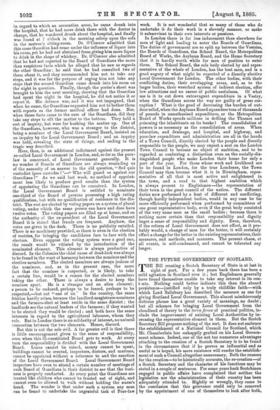ANOTHER LONDON GOVERNMENT SCANDAL.
TT is a curious thing that scandals, like sorrows, always come in battalions. The Weldon case was followed by a crop of lunacy eases in which sane people had been hurried into asylums on the very smallest provocation. The Homerton Hospital case was hardly finished before another inquiry was begun, disclosing almost as scandalous a state of things in the Infirmary of St. George's in the East. The tragical end of one of the principal persons concerned brought the inquiry to a sudden conclusion. But the death of Dr. O'Connor, to say nothing of the evidence already given in the inquiry, was enough to call public attention to the mismanagement that existed here as elsewhere uncler the present rotten state of local government. At St. George's in the East the subject of the inquiry was certain charges brought against the Matron of the Infirmary, reflecting on her chastity and her sobriety. It cannot be said that the charges were proved. The doctor, whose suicide has stopped the proceedings, and a nurse both swore that on one occasion the matron was drunk in the night wards ; but the doctor whose business it was, as head of the infirmary, to report her to the Guardians for drunkenness, did not do so, and the nurse, who threatened to report her, afterwards wrote a letter saying she did not intend to report her contemptuous behaviour, and did not say anything about drunkenness. The other charge was brought in connection with one of the Guardians, and the evidence was conflicting, oath against oath, on which only a jury who saw and heard the witnesses and the whole case would be able to give a sound verdict. But enough was proved as to the general state of affairs to show a very scandalous condition of things. One of the Guardians implicated---who, to stave off a Local Government Board inquiry, had sent in his resignation, which he afterwards withdrew—admitted that he was in the habit of spending hours at a time in the matron's room in the evening. Another of the Guardians, whose conduct was the immediate cause of the inquiry, and who has also resigned, but withdrew his resignation, also admitted that on the night in regard to which an accusation arose, he came drunk into the hospital, that he had more drink there with the doctor in charge, that he wandered drunk about the hospital, and finally was found at 7 o'clock in the morning asleep upon the sofa in the matron's sitting-room. Dr. O'Connor admitted that this same Guardian had come under the influence of liquor into his room, yet he had not abstained from giving him more liquor to drink in the shape of whiskey. Dr. O'Connor also admitted that he had not reported to the Board of Guardians the more than suspicious facts which he alleged that he saw as regards the other Guardian ; he said that he had consulted two of them about it, and they recommended him not to take any steps, and it was for the purpose of urging him not take any steps that the second Guardian came drunk into his room on the night in question. Finally, though the porter's sheet was brought to him the next morning, showing that the Guardian had spent the night in the hospital, he did not notice it or report it. His defence was, and it was not impugned, that when he came, the Guardians requested him not to bother them with reports as the former medical officer had done. Nor, when those facts came to the ears of the Guardians, did they take any steps to sift the matter to the bottom. They held a sort of inquiry, but were for hushing the matter up. One of the Guardians, however, who was a stranger to the district, being a nominee of the Local Government Board, insisted on an inquiry by the Local Government Board ; and an inquiry was held, revealing the state of things, and ending in the tragic way described. Here, then, is an additional indictment against the present so-called Local Government in London, and, so far as the poor- law is concerned, of Local Government generally. It is no wonder if Boards of Guardians are always reminding us of the necessity of an answer to the old question,"Sod quis custodiet ipsos custodes I"—" Who will guard us against our Guardians I" As we said last week, no method of appoint- ment less likely to produce good results than the system of appointing the Guardians can be conceived. In London, the Local Government Board is entitled to nominate one-third of the Board of persons possessing a high rating qualification, but with no qualification of residence in the dis- trict. The rest are elected by voting papers on a system of plural voting, under which the same person can have and does have twelve votes. The voting papers are filled up at home, and on -the authority of the ex-president of the Local Government Board it is stated that frauds are frequent. Anyhow, the votes are given in the dark. There is no publicity entailed. There is no machinery provided, as there is even in the election of vestries, for bringing the candidates face to face with the -electors. Even suppose the voting system were a good one, the result would be vitiated by the introduction of the nominated element. This element is always productive of discord. In the Colonies the chief cause of dead-lock was always to be found in the want of harmony between the nominee and the elective members. The elected members are always jealous of the nominees, and, as in the present case, the mere fact that the nominee is suspected, or is likely, to take a certain line, would be a reason for the elected members taking the other. There is always a desire to keep the nominee apart. He is a stranger and an alien element; a person to be endured, perhaps to be feared, perhaps to be respected,—bat not "one of us." In the country, the same friction hardly arises, because the landlord-magistrate-nominees and the farmers-elect at least reside in the same district ; the landlords are the natural leaders of the farmers ; if they wanted to be elected they would be elected ; and both have the same interests in regard to the agricultural labourer, whom they rule. But in London there is no solidarity of interest, no natural connection between the two elements. Hence, discord.
But this is not the sole evil. A far greater evil is that there is little encouragement given to the sense of responsibility, even when this ill-constituted Board gets to work. At every turn the responsibility is divided with the Local Government Board. Loans cannot be raised, money cannot be spent, buildings cannot be erected, inspectors, doctors, and matrons, cannot be appointed without a reference to and the sanction of the Local Government Board. Local Government Board inspectors have even to attend a certain number of meetings of each Board of Guardians in their district to see that the busi- ness is properly conducted. At every point the Guardians are treated like children who cannot be trusted out of sight, and cannot even be allowed to walk without holding the nurse's hand. The wonder is that under such a system any man can be found to undertake the ungrateful task of Poor-law work. It is not wonderful that so many of those who do undertake it do their work in a slovenly manner, or make it subservient to their own interests or passions. In London there is far less inducement than elsewhere for men of light and leading to enter the Boards of Guardians. The duties of government are so split up between the Vestries, the Boards of Guardians, the School Board, the Metropolitan Board of Works, the Asylums Board, and the Home Secretary that it is hardly worth while for men of position to enter them. The School Board, the sole body elected by and repre- sentative of the whole of London, has the best men, and is a good augury of what might be expected of a directly elective Local Government for London. The other bodies, with their conflicting duties, their overlapping areas, and, as to the larger bodies, their wretched system of indirect election, offer few attractions and no career of public usefulness. Of what use is it to cut down extravagant expenditure in a Vestry, when the Guardians across the way are guilty of gross cor- ruption? What is the good of decreasing the burden of out- door relief, when the Asylums Board squanders tens of thousands of pounds in unauthorised expenditure, or the Metropolitan Board of Works spends millions in defiling the Thames and poisoning the inhabitants on its banks? The consolidation of powers is as necessary as the consolidation of areas. When education, and drainage, and hospital, and highway, and poor-law expenditure and administration are all in the hands of a Town Council, directly elected by the people and directly responsible to the people, we may expect a seat on the London Town Council to become an object of ambition, and to be regarded as conferring a distinction even on the socially-dis- tinguished people who make London their home for only a part of the year. For those whose work and livelihood are to be found in London, for the true Londoner, the Town Council may then become what it is in Birmingham, repre- sentative of all that is most active and enlightened in the town, and a road to that highest ambition which is always present to Englishmen—the representation of their town in the great council of the nation. The different duties now performed by a host of different and conflicting, though hardly independent bodies, would in any case be far more efficiently performed when performed by committees of one great representative body, even if the great body consisted of the very same men as the small bodies ; because there is nothing more certain than that responsibility and dignity beget a sense of responsibility and dignity. Even, therefore, if the reform of Local Government does not effect, as it pro- bably would, a change of men for the better, it will certainly effect a change for the better in the existing representatives, their measures, and methods, and manners. The present chaos, at all events, is self-condemned, and cannot be tolerated any longer.



































 Previous page
Previous page